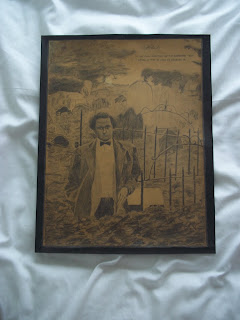
‘I just can’t think what to do with my time.’
But, a cat for curiosity,
I measure the light in darkness
And look for the darkness in light,
As I prowl round Friday night bars
And reach a place known well
To its theatrical clientele.
As in every pub, heads turn
To clock the new arrival,
But in here, the heads stay turned
And you can almost feel the eyes
Point like hands to the new number.
Dusty Springfield on the jukebox…
Mascara winks and takes Me back
Down the years to ‘Ready Steady Go’
Promising ‘The Weekend Starts Here’
‘I just don’t know what to do with myself.’
The place is just swarming with cats,
Though, cornered in their queenly midst,
Are a few cropped, dumpy bitches
Hunched over flat pints of lager,
Sealing roll-ups on thin, pale lips.
‘Going to a movie only makes me sad,
Parties make me feel as bad.’
I feel like some gauche wildebeest
Stranded on the Serengeti
As drooling hyenas cackle
And lions enlivened close in.
‘I’m so used to doing everything with you.’
Oh, man, look up, down, anywhere!
Beware those fluffy Chinchillas
Fluttering long black eyelashes
And the fat, epicene Burmese
Who’ve seen everything before;
Angular, urbane Siamese
Swirling neat whiskey on the rocks;
A few mangy old alley cats,
Lean and cynical at the bar
And the sad domestic tabbies
Hungry, furtive and fugitive
From marriages heading for the rocks.
‘When I’m not with you, I just don’t know what to do.’
Glassy cats’ eyes torch through smoke
With their challenge of fire and ice
To the dark kennel of the skull
Where lies buried a hard bone of vice.
(1979)
There’s a double sense of dislocation going on here. I wasn’t feeling comfortable at home around this time so I would drift around places where I knew I’d feel OK – namely, pubs. This one however, didn’t work for me.
P.S. Isn't Dusty Springfield the greatest female singer of all time?






